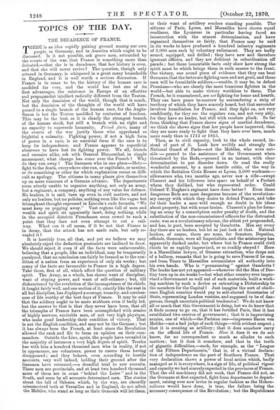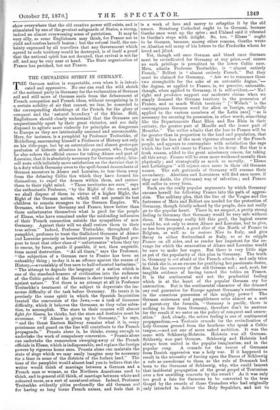TOPICS OF THE DAY.
THE DECADENCE OF FRANCE.
THERE is an idea rapidly gaining ground among our own people, in Germany, and in America which ought to be discussed. Is it not possible, ask grave men, astounded by the events of the war, that France is something more than defeated,—that she is in decadence, that her history is over, and that she will never revive? The question, though only uttered in Germany, is whispered in a great many households in England, and it is well worth a serious discussion. If France is to cease to be, the history of the human race is modified for ever, and the world has lost one of its first advantages, the existence in Europe of an effective and propagandist intellect radically different from the Teuton. Not only the dominion of the world, though that is much, but the dominion of the thoughts of the world will have passed to a single branch of the human race, for the Anglo- Saxon is but the Teuton modified by centuries of freedom. This may be the best, as it is clearly the strongest branch of the human stock, but still a branch with no right and no capacity to supersede humanity. Primd facie, many of the events of the war justify those who apprehend so frightful a calamity. Fighting power, if not a high form of power in a race, is an essential form if the race is to keep its independence, and France appears to superficial observers to have lost its fighting power. We all, friends and enemies alike, ask with General Blumenthal, in simple amazement, what change has come over the French ? Why do they run away ? The linesmen who in one place—Metz---- fightto the death, everywhere else run, or capitulate, or mutiny, or do something or other for which explanation seems as diffi- cult as apology. The citizens in many places give themselves up on mere rumours of a German advance. The departments seem utterly unable to organize anything, not only an army, but a regiment, a company, anything of any value for defence. No leaders, it is said, turn up even in civil matters, and not only no leaders, but no policies, nothing even like the vague but triumphant thought expressed in Lincoln's rude formula, "We must keep on pegging away." Vast regions full of men and wealth and spirit sit apparently inert, doing nothing, while in the occupied districts Frenchmen seem cowed to such a point that they dare not even attempt to cut a rail- way. What can it all mean, if it be not that France is in decay, that the attack has not made ruin, but only re- vealed it ?
It is horribly true, all that, and yet we believe we may absolutely reject the deduction pessimists are inclined to draw. We should reject it even if all the facts were unfavourable, believing that a people, like an individual, may be temporarily paralyzed, that no conclusion can fairly be formed as to the con- dition of a nation from an experience of only six weeks ; but many of the facts are favourable to France in a high degree. Take those, first of all, which affect the question of military spirit. The Army, as a whole, has shown want of discipline, want of staying power, and want of self-reliance ; but, till disheartened by the revelation of the incompetence of its chiefs, it fought fairly well, and one section of it, exactly like the rest in all but discipline, has displayed a courage, tenacity, and careless- ness of life worthy of the best days of France. It may be said that the soldiery ought to be more stubborn even if badly led, but the answer to that is that they never have been, that all the triumphs of France have been accomplished with armies of highly nervous, excitable men, of not very high physique, who make good leadership their condition of victory. That is not the English condition, and may not be the German ; but it has always been the French, at least since the Revolution allowed the rank and file to form an opinion on their com- manders. Outside the Line, again, the people have revealed in the majority of instances a very high degree of spirit. Trochu has with him a hundred thousand men who in reality, if not in appearance, are volunteers, power to coerce them having disappeared ; and they behave, even according to hostile accounts, very well indeed, holding their ground after the linesmen have retreated,—a dreadful trial to raw recruits. These men are provincials, and at least two hundred thousand more of them are in arms "behind the Loire" and in the South, and seem by all accounts determined men. The stories about the fall of Orleans, which, by the way, are absurdly misconceived both at Versailles and in England, do not affect the Mobiles, who stand as long as their Generals will let them, or their want of artillery renders standing possible. The sitizens of Paris, Lyons, and Marseilles have shown equal readiness, the Lyonnese in particular having faced ao insurrection with the utmost determination, and have organized themselves so fairly, that France may be said in six weeks to have produced a hundred infantry regiments. of 3,000 men each by voluntary enlistment. They are badly armed, equipped, and drilled ; they have new and therefore ignorant officers, and they are deficient in subordination off' parade ; but those lamentable facts only show how strong the spirit must be which brings them in such masses to the front Onevictory, one sound piece of evidence that they can beat Germans, that the latter are fighting men and not genii, and these- men will be formidable soldiers,—unable, it may be, to defeat
Prussians—who are clearly the most tenacious fighters in the- world—but able to make victory worthless to them. The French, be it remembered, are not fighting for home and hearth. They can have peace to-morrow by surrendering a strip of territory of which they have scarcely heard, but that surrender- involves humiliation for France, and they fight on, not very confidently, for they see the regulars run, and not very ably, for they have no leader, but still with resolute pluck. So far- from thinking that France shows signs of martial decadence,. we think she shows signs that her people have improved, that they are more ready to fight than they have ever been, much more ready than in 1713 or 1815.
Then, as to civil capacity, look to the whole record, in- stead of part of it. Look how swiftly and strongly the National Guard of Paris—not the Mobiles, who were out- side — poured to the assistance of the Government whem threatened by the Reds,—poured in an instant, with clear determination to put disorder down. Or read the really wonderful account, by a most hostile critic, of the way in which the Battalion Croix Rousse at Lyons, 3,000 workmen- silkweavers who, two months ago, never saw a rifle—swept Cluseret and his followers into space on behalf of a Prefect. whom they disliked, but who represented order. Could Colonel T. Hughes's regiment have done better ? Even these dangerous Reds are most dangerous because of the revolution- ary energy with which they desire to defend France, and take- for their leader a man wild enough no doubt in his ideas about property, but with some brains. Cluseret's plan for form- ing an army by a conscription under penalty of death, and the substitution of the non-commissioned officers for the distrusted caste, was as a revolutionary scheme, the ablest yet propounded,. and has, in part, been accepted by Gambetta. Men say every- day there are no leaders, but let us just look at that. Natural leaders, of course, there are none, for Senators, Deputies,. officials, Generals, were all Imperialists, and the aristocracy has apparently ducked under, but where but in. France could civib chiefs be so rapidly improvised, or so readily obeyed ? Here is a Marseillaise lawyer, of Genoese extraction, who drops out- of a balloon, remarks that he is going to save France if he can, and from Tours to Marseilles accumulates all authority into his own hands. , Who is " pronouncing " against Gambetta The leader has not yet appeared—whenever did the Man of Des- tiny turn up in six weeks ?—but what other country ever impro- vised a Government so well out of such materials, built a work- ing machine by such a device as entrusting a Dictatorship to the members for the Capital? Just imagine the sort of obedi- ence English counties would pay to self-elected Secretaries of State, representing London vestries, and supposed to be of dan- gerous, though uncertain political tendencies ! We do not know all or much that this Government is doing, but we do know that it finds money to go on, that it has fortified Paris, that it has. established two centres of government ; that it is improvising armies, one of which—the Parisian one—impresses Baron von Moltke—not a bad judge of such things—with evident respect ; that it is creating an artillery ; that it does somehow carry on the official life of France. How it does it we do not know, for no correspondent so much as alludes to such matters ; but it does it somehow, and that in the teeth of gigantic difficulties,—such, for example, as the "League of the Fifteen Departments," that is, of a virtual declara- tion of independence on the part of Southern France. That very declaration shows a power of local action which, badly managed as it is everywhere, is a sign of life, of political vigour- and capacity we had scarcelyexpected in the provinces of France. That the old machinery did not work, that France did not, as the Germans at first expected, fight from department to depart- ment, raising ever new levies in regular fashion as the Hohen- zollerns would have done, is true, the failure being the necessary consequence of the Revolution ; but the Republicans show everywhere that the old creative power still exists, and is stimulated by one of the greatest safeguards of States, a strong, indeed an almost overweening sense of patriotism. It may be 'very silly, as some Englishmen may think, for France not to yield and confess herself beaten ; but the refusal itself, the cer- tainty expressed by all travellers that any Government which agreed to cede territory would be destroyed, is of itself a proof that the national spirit has not decayed, that revival is not far Off, and may be very near at hand. The State organization of France has perished, but not France.































 Previous page
Previous page